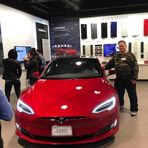The Electric Vehicle Tug-of-War: Lucid and Tesla Face Headwinds
July 3, 2025, 3:54 am

Location: United States, California, Newark
Employees: 1001-5000
Founded date: 2007
Total raised: $4.5B

Location: United States, California, Irvine
Employees: 10001+
Founded date: 2009
Total raised: $18.8B

Location: United States, Texas, Austin
Employees: 10001+
Founded date: 2003
Total raised: $3.86B
The electric vehicle (EV) market is a battleground. Two giants, Lucid and Tesla, are grappling with challenges that threaten their growth. As they navigate a landscape marked by economic uncertainty, high interest rates, and shifting consumer preferences, their latest quarterly results reveal a stark reality.
Lucid Motors reported a 38% increase in deliveries for the second quarter of 2025. Yet, the numbers fell short of Wall Street's expectations. They delivered 3,309 vehicles, missing the anticipated 3,611. The previous year, they managed 2,394. Growth is evident, but it’s not enough to satisfy investors.
Meanwhile, Tesla is facing a storm of its own. The company’s deliveries plummeted by 13.5%, marking a second consecutive quarterly decline. They handed over 384,122 vehicles, down from 443,956 a year ago. Analysts had hoped for better, estimating deliveries around 394,378. The gap between expectation and reality is widening.
The economic backdrop is turbulent. High interest rates are squeezing consumers. Many are opting for cheaper hybrid or gasoline-powered vehicles instead of luxury EVs. Lucid, with its premium price tag, is feeling the pinch. The company’s interim CEO, Marc Winterhoff, has acknowledged rising costs due to tariffs. This adds another layer of complexity to their operations.
Tesla, too, is grappling with the fallout from economic pressures. The company needs to deliver over one million vehicles in the second half of the year to meet its growth goals. This task looms large, especially with the uncertainty surrounding tariffs and potential changes to EV incentives. The $7,500 tax credit for new EV purchases is under threat, which could further dampen demand.
The political landscape complicates matters. CEO Elon Musk’s right-wing political stances have alienated some buyers. This shift in public perception has hurt Tesla’s sales, particularly in Europe and the U.S. The company’s image is tarnished, and the impact is palpable. Investors are wary, watching closely as the situation unfolds.
In contrast, Lucid is banking on its new Gravity SUV and a mid-size car aimed at the $50,000 price point. These models are crucial for expanding their market share. The company is trying to diversify its offerings, but the path is fraught with challenges. The luxury EV market is competitive, and consumer preferences are shifting.
Tesla’s challenges are compounded by an aging vehicle lineup. The company has promised a cheaper model, a pared-down version of the Model Y, but delays have plagued its rollout. Meanwhile, competitors are flooding the market with snazzier, feature-rich EVs. Tesla’s once-unassailable lead is under threat.
Despite the hurdles, there are glimmers of hope. Tesla has seen a modest recovery in China, where its refreshed Model Y is gaining traction. Sales in Norway and Spain have also picked up. These markets offer a lifeline, but they are not enough to offset the broader decline.
Lucid’s production numbers are also on the rise. They manufactured 3,863 vehicles in the last quarter, up from 2,110 a year ago. However, this too fell short of expectations. The company’s production targets remain intact, but the pressure is mounting. Investors are anxious, and the stakes are high.
The EV market is evolving rapidly. Consumer preferences are shifting towards affordability and practicality. As interest rates rise, buyers are becoming more cautious. The allure of luxury EVs is fading. Both Lucid and Tesla must adapt or risk being left behind.
The competition is fierce. Rivals are not standing still. Companies like Rivian and BYD are making strides, capturing market share. The landscape is changing, and the pressure is on. Lucid and Tesla must innovate and respond to consumer demands.
In this electric vehicle tug-of-war, the stakes are high. Lucid and Tesla are at a crossroads. They must navigate economic uncertainty, shifting consumer preferences, and fierce competition. The road ahead is challenging, but the potential rewards are immense.
As the second half of 2025 unfolds, all eyes will be on these two automakers. Will they rise to the occasion, or will they falter under pressure? The electric vehicle market is a dynamic arena, and only the most adaptable will thrive. The future is electric, but it’s also uncertain.
In conclusion, the battle for dominance in the EV market is far from over. Lucid and Tesla are both facing significant challenges, but they also have opportunities to seize. The next few quarters will be crucial. The electric vehicle revolution is here, but it’s a rocky road ahead.
Lucid Motors reported a 38% increase in deliveries for the second quarter of 2025. Yet, the numbers fell short of Wall Street's expectations. They delivered 3,309 vehicles, missing the anticipated 3,611. The previous year, they managed 2,394. Growth is evident, but it’s not enough to satisfy investors.
Meanwhile, Tesla is facing a storm of its own. The company’s deliveries plummeted by 13.5%, marking a second consecutive quarterly decline. They handed over 384,122 vehicles, down from 443,956 a year ago. Analysts had hoped for better, estimating deliveries around 394,378. The gap between expectation and reality is widening.
The economic backdrop is turbulent. High interest rates are squeezing consumers. Many are opting for cheaper hybrid or gasoline-powered vehicles instead of luxury EVs. Lucid, with its premium price tag, is feeling the pinch. The company’s interim CEO, Marc Winterhoff, has acknowledged rising costs due to tariffs. This adds another layer of complexity to their operations.
Tesla, too, is grappling with the fallout from economic pressures. The company needs to deliver over one million vehicles in the second half of the year to meet its growth goals. This task looms large, especially with the uncertainty surrounding tariffs and potential changes to EV incentives. The $7,500 tax credit for new EV purchases is under threat, which could further dampen demand.
The political landscape complicates matters. CEO Elon Musk’s right-wing political stances have alienated some buyers. This shift in public perception has hurt Tesla’s sales, particularly in Europe and the U.S. The company’s image is tarnished, and the impact is palpable. Investors are wary, watching closely as the situation unfolds.
In contrast, Lucid is banking on its new Gravity SUV and a mid-size car aimed at the $50,000 price point. These models are crucial for expanding their market share. The company is trying to diversify its offerings, but the path is fraught with challenges. The luxury EV market is competitive, and consumer preferences are shifting.
Tesla’s challenges are compounded by an aging vehicle lineup. The company has promised a cheaper model, a pared-down version of the Model Y, but delays have plagued its rollout. Meanwhile, competitors are flooding the market with snazzier, feature-rich EVs. Tesla’s once-unassailable lead is under threat.
Despite the hurdles, there are glimmers of hope. Tesla has seen a modest recovery in China, where its refreshed Model Y is gaining traction. Sales in Norway and Spain have also picked up. These markets offer a lifeline, but they are not enough to offset the broader decline.
Lucid’s production numbers are also on the rise. They manufactured 3,863 vehicles in the last quarter, up from 2,110 a year ago. However, this too fell short of expectations. The company’s production targets remain intact, but the pressure is mounting. Investors are anxious, and the stakes are high.
The EV market is evolving rapidly. Consumer preferences are shifting towards affordability and practicality. As interest rates rise, buyers are becoming more cautious. The allure of luxury EVs is fading. Both Lucid and Tesla must adapt or risk being left behind.
The competition is fierce. Rivals are not standing still. Companies like Rivian and BYD are making strides, capturing market share. The landscape is changing, and the pressure is on. Lucid and Tesla must innovate and respond to consumer demands.
In this electric vehicle tug-of-war, the stakes are high. Lucid and Tesla are at a crossroads. They must navigate economic uncertainty, shifting consumer preferences, and fierce competition. The road ahead is challenging, but the potential rewards are immense.
As the second half of 2025 unfolds, all eyes will be on these two automakers. Will they rise to the occasion, or will they falter under pressure? The electric vehicle market is a dynamic arena, and only the most adaptable will thrive. The future is electric, but it’s also uncertain.
In conclusion, the battle for dominance in the EV market is far from over. Lucid and Tesla are both facing significant challenges, but they also have opportunities to seize. The next few quarters will be crucial. The electric vehicle revolution is here, but it’s a rocky road ahead.
